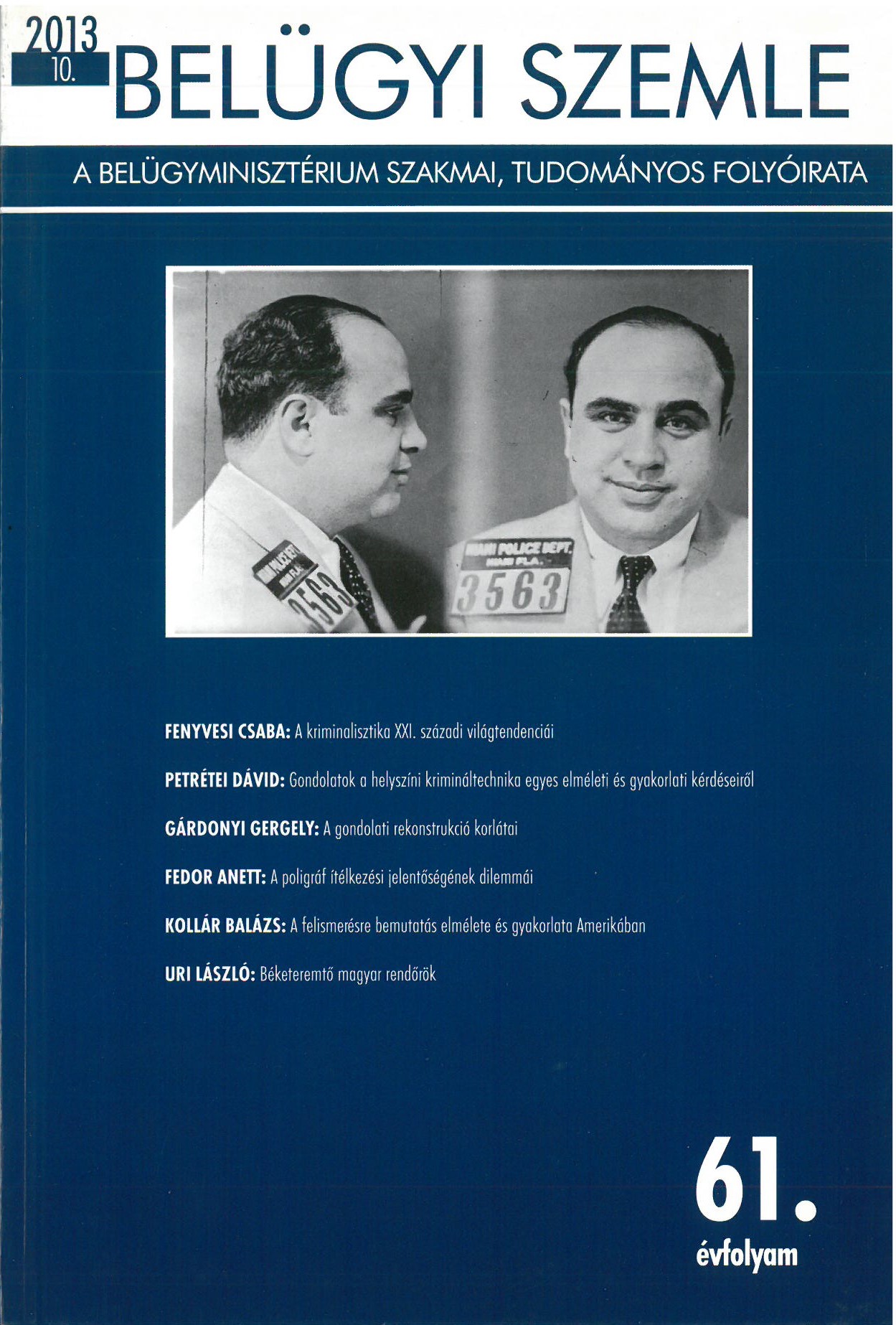Keywords
school shooting
analysis
forensics
analysis
forensics
How to Cite
Systematic crime scene investigation-triggered lessons for problem oriented policing: the case study of shootings in a Hungarian university. (2013). Academic Journal of Internal Affairs, 61(10), 127-143. https://doi.org/10.38146/bsz-ajia.2013.v61.i10.pp127-143
Abstract
Focusing on systematic crime scene investigation, in a recent, highly publicized shooting in a Hungarian university, the author highlights the benefits of problem oriented policing.
References
.

This work is licensed under a Creative Commons Attribution-NonCommercial-NoDerivatives 4.0 International License.
Copyright (c) 2024 Academic Journal of Internal Affairs
Downloads
Download data is not yet available.
Similar Articles
- Miklós Gáspár, Kund Regényi, Comparison of traditional and modern firearms trainings and the closely interacting shooting sports , Academic Journal of Internal Affairs: Vol. 69 No. 2. ksz. (2021): Special Issue
- Zsuzsanna Borbély, Péter Cieleszky, Zoltán Csizner, Gábor Éberhardt, Tünde Pesti, Laura Schmidt, Zita Veprik, Fanni Vizvári, International Law Enforcement Observer I. , Academic Journal of Internal Affairs: Vol. 69 No. 2 (2021)
- Gergely Dr. Fliegauf, Eszter Dóra Várnai, Criminogenic Risk Factors and the Onset of Suicidal Intentions in Adolescents Engaging in Deliberate Self-Poisoning: Proposed Hypotheses from Psychiatric Consultation Observations. , Academic Journal of Internal Affairs: Vol. 72 No. 8 (2024)
- Kornél Girhiny, The criminalistic development of on-site interviews in Hungary , Academic Journal of Internal Affairs: Vol. 72 No. 6 (2024)
- Orsolya Bolyky , Eszter Sárik, Considerations on child and juvenile criminality in the light of statistics , Academic Journal of Internal Affairs: Vol. 71 No. 10 (2023)
- András Czebe, Fuzzy logic behind forensic identity , Academic Journal of Internal Affairs: Vol. 68 No. 2. ksz. (2020): Special Issue
- Csaba Kollár, Examination of key positions and forms of employment in the private security sector , Academic Journal of Internal Affairs: Vol. 69 No. 2 (2021)
- Emőke Noémi Baráth, Researcher gold mine? Researchability of the Modus Operandi Register , Academic Journal of Internal Affairs: Vol. 70 No. 1 (2022)
- Dávid Petrétei, Theoretical Issues of the Trace and Pattern Evidences in the 21th Century , Academic Journal of Internal Affairs: Vol. 70 No. 5 (2022)
- János Szabó, International framework for criminal analysis , Academic Journal of Internal Affairs: Vol. 71 No. 2 (2023)
You may also start an advanced similarity search for this article.
Most read articles by the same author(s)
- Miklós Angyal, Asymmetric bars. Reflections on Gergely Gárdonyi: The Limits of Thought Reconstruction. Belügyi Szemle, 2013/10. , Academic Journal of Internal Affairs: Vol. 62 No. 3 (2014)
- Miklós Angyal, Zadig, Holmes and ensign Zoltán, or what can prove an investigator? , Academic Journal of Internal Affairs: Vol. 69 No. 10 (2021)
- Miklós Angyal, Antal Kricskovics, Challenges in investigating infanticides , Academic Journal of Internal Affairs: Vol. 64 No. 7-8 (2016)
- Miklós Angyal, A proposal for the establishment of a Hungarian DVI Team , Academic Journal of Internal Affairs: Vol. 62 No. 11 (2014)
- Miklós Angyal, Forensic thinking – reloaded , Academic Journal of Internal Affairs: Vol. 67 No. 3 (2019)
